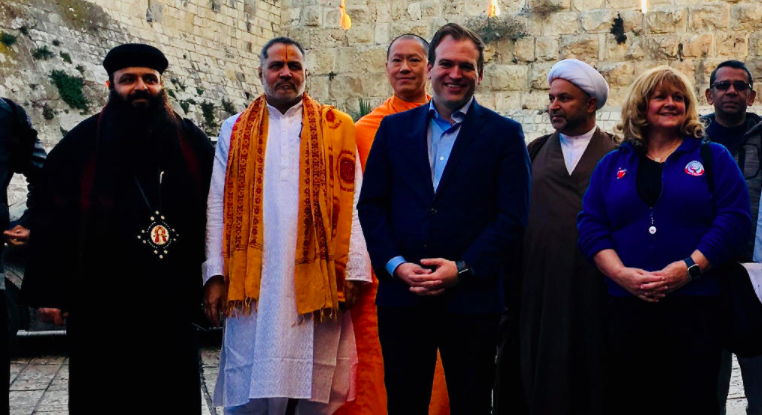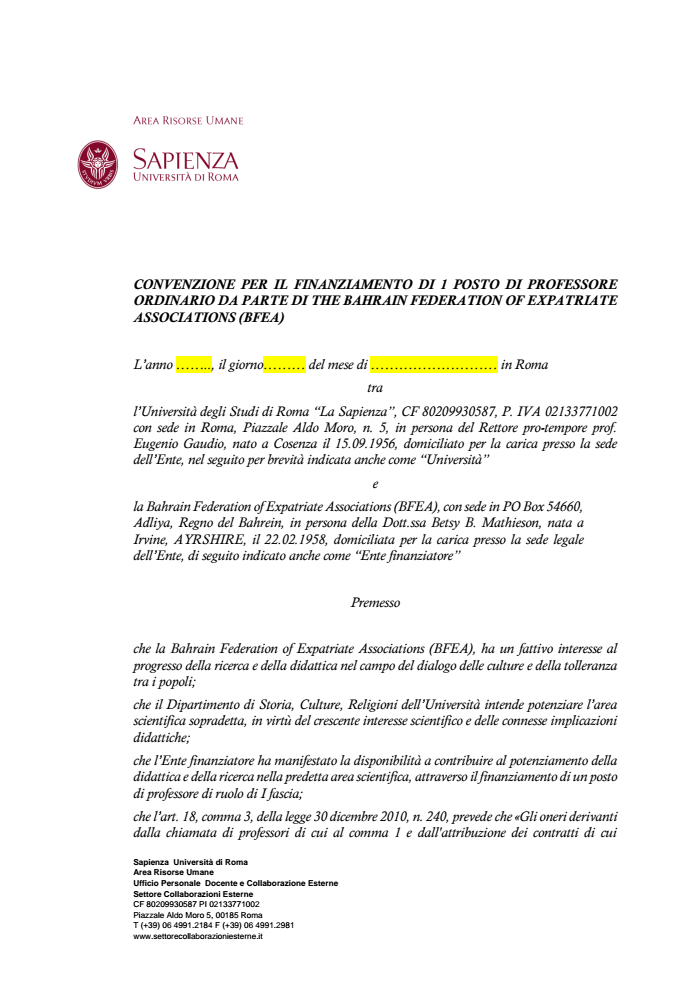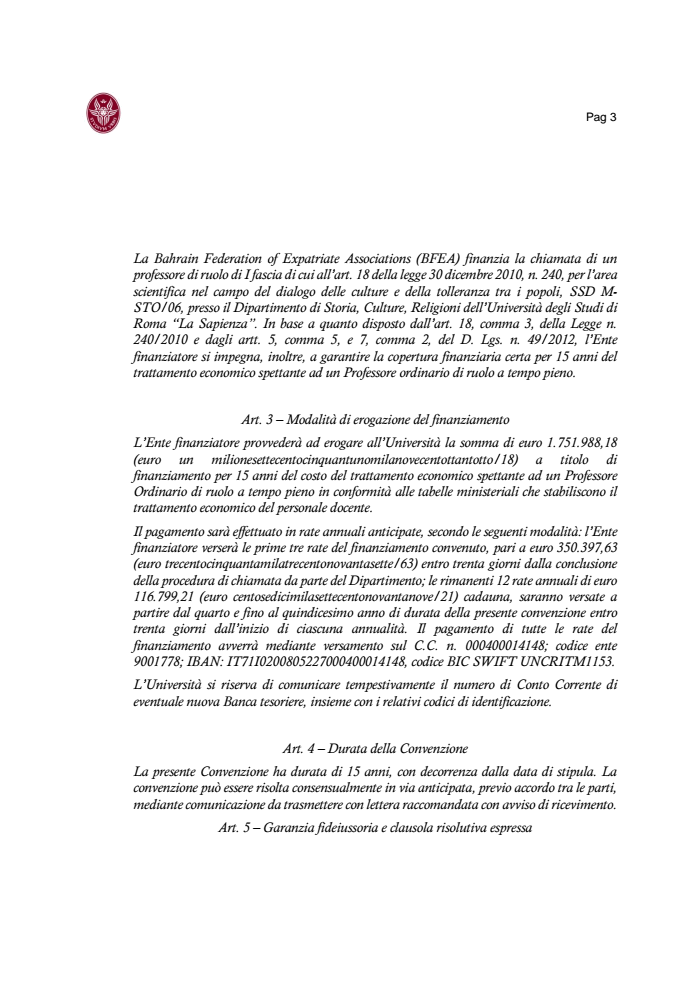This weekend, the news spread that a delegation of religious leaders from Bahrain was visiting Israel and Jerusalem at the same time that Israeli troops were shooting Palestinians protesting against Donald Trump’s unilateral decision to recognise Jerusalem as the capital of Israel. The delegation was made up of 24 members of a pro-monarchy organisation called This is Bahrain, who were purportedly sent by King Hamad to “send a message of peace”.
The visit to Israel is the latest act in a strategy bringing together an unlikely set of bed-fellows, including the King of Bahrain, right-wing pro-Israel rabbis, an evangelical spiritual adviser to Donald Trump and a Scottish born campaigner who is more loyal to the Bahraini monarchy than the king himself, whose campaigning group, as we reveal, made a whopping $2 million donation to the University of Rome in the king’s name. It is a strategy which claims to be about religious tolerance, but is based on the intolerance for social justice that the regimes of both Bahrain and Israel base their rule on.
The news of the visit was met with widespread anger by Bahrainis and Arabs on social media, that an Arab country would send a peace delegation to Israel at such a time. PLO leader Hanan Ashrawi was quoted in the Jerusalem Post as saying the move was “the height of insensitivity”:
To come at this time when Trump has provoked everyone and given the Arab world a big slap in the face, to come in the name of inclusiveness and tolerance to Jerusalem in which Palestinians who don’t have Jerusalem IDs, have no access to Jerusalem or the holy sites or their institutions or families, to do that now is unbelievable.
Bahraini opposition politician Ebrahim Sharif, of the Left-leaning Wa’ad party tweeted:
I consider the visit made by the “This is Bahrain” group to Occupied Jerusalem as a betrayal of the Palestinian people, and I declare my non-association with those who carried it out and supported it.
Meanwhile, photos posted on Twitter on Monday morning suggested that some Palestinian youths were gathering at the Beit Hanoun border crossing between Israel and Gaza to greet the Bahraini delegation with eggs if they seek to enter.
Late on Sunday, the Bahrain’s state news agency issued a statement distancing itself from the delegation, asserting that the visit was undertaken at the initiative of This is Bahrain alone, and that they do not represent any official state body. The facts however tell a different story.
The Bahrain Make-Over

In the aftermath of the pro-democracy movement in Bahrain, and bloody government crackdown in 2011, the Bahraini government and supporters of the Al Khalifa monarchy were eager to reverse the negative image of them that was presented in some of the Western media. It was, of course, just the negative image that they wanted to change — not the unflattering reality of autocracy, repression and torture in Bahrain.
Part of the strategy included throwing money at Western PR companies to try and do the white-washing. Clients and beneficiaries of the Al Khalifa regime also took their own initiatives to defend the monarchy, by presenting Bahrain as a liberal, diverse and religiously-tolerant country. According to this narrative, it is only the enlightened King who stands in the way of these religious freedoms from being abolished by the radical Shia extremists who would take over if a democratic form of government is allowed.
In order to push this narrative, attempts were made to politicise sections of Bahrain’s large expatriate population, who until then had been largely forbidden from any form of expression on domestic politics. As a religiously and ethnically diverse body — and one that was already structurally beholden to the ruling regime — the expatriate community was perfect for the narrative of the apologists.
To this end, in June 2011 a selected group of expatriates were given an audience by King Hamad at his palace in a scripted event consisting exclusively of panegyric speeches. Despite the overwhelming majority of expatriates in Bahrain being brown-skinned working class South and Southeast Asians, the speakers at the event were all apparently rich white-skinned people with British accents, consisting of a British businessman, a British employee of Bahrain’s police force, two British students, and a British spa and beauty school owner.
The spa owner, Scottish born Betsy Mathieson, recited an over the top poem called the Betrayal of the Kingdom of Love, about how the popular movement for democracy in Bahrain upset the lives of the ruling class and their portrayal in the international media, including verses such as:
Bahrain of love and peace a haven
Loyalty to our leaders remained unshaken
Despite the treacherous acts uncrying
Love of King and Kingdom undying.The world may judge on false tears and lying
BBC, CNN, Sky News are flying
With lies, more lies, and dramatic sighing
Mathieson would go on to become a primary apologist for the Bahraini monarchy around the world. As a result of the 2011 audience with King Hamad, the following year, the government approved the formation of the Bahrain Federation of Expatriate Associations(BFEA) headed by Mathieson. Its mandate includes: “representing its members in conferences and other events abroad and express opinions on topics referred to it by the ministry [of social development]”.
The highlight of the BFEA’s work has been an international roadshow named This is Bahrain sending delegations of people from Bahrain to Western cities. The delegations hold exhibitions, press conferences and meetings in the cities they visit to push the narrative of Bahrain’s royally-cultivated diversity and religious freedom. The delegations have been as large as 200 people, consisting of a mix of Bahraini citizens and expatriate residents and representing many of the various religious denominations existing in the country — but none of Bahrain’s political diversity. The delegation members are always united in their overeager praise for Bahrain’s government and monarchy.
So far the This is Bahrain roadshow has travelled to London, Berlin, Brussels, Paris (where a special exhibition was held to highlight the personal achievements of King Hamad’s son), Washington (MoUs were reportedly signed with local Hindu and Buddhistorganisations), New York, Rome, Los Angeles, and the now infamous trip to Israel. (To get a sense of what goes on at these roadshows, read Hanging Out with Western Sycophants at the ‘This Is Bahrain’ Conference on Vice).
While in Rome the King’s son Nasser bin Hamad and Mathieson inaugurated the “King Hamad Chair for Peaceful Coexistence” which will fund one full-time professor at the Sapienza University of Rome for 15 years. According to documentation posted on the university’s website the chair is being funded by the BFEA at a cost of 1,751,988 euros (about US$ 2.06 million), which was paid in full in March 2017.
During the visit to LA, the 40-person Bahraini delegation, lead by Nasser bin Hamad, launched the Bahrain Declaration on Religious Tolerance, at a high-profile event at the Simon Wiesenthal Center. The declaration is a document supposedly written by King Hamad stating that all individuals should have the freedom to worship as they wish (but in typical liberal fashion, it has nothing to say about the role of material inequality in stoking religious intolerance).
In addition to the international roadshow, the Mathieson and the BFEA has organised several other activities, such as:
- A “Thank you Bahrain” carnival, where expatriates express their thanks to the monarchy
- Several editions of the “Bahrain for All, All for Bahrain” festival (May 2013, Nov 2013, 2014, 2016, 2017) to pay tribute to Bahrain’s prime minister
- “This is Bahrain” festivals in Bahrain (2015, 2016, 2017)
- A Prayer for Peace, attended by a rabbi and imam from France
- Travelling to Geneva to counter Bahraini human rights activists at the UN Human Rights Council
With the Blessing of His Majesty

It is not clear who is funding the BFEA’s events and exhibition around the world, not to mention the $2 million cheque to the University or Rome. However it is clear that all of these events are happening with the full knowledge, blessing and logistical supportof the King and senior government officials.
Most of the events are officially patronised by the King, Prime Minister, or other royal family member. Government officials and members of the royally-selected Shura Council are regularly part of the foreign delegations. The King’s son, Nasser, seems particularly close to BFEA, having been deputed on multiple occasions to represent his father at This is Bahrain events.
The King and other officials regularly meet with Mathieson and the foreign delegations, to thank and praise them for their efforts. All of the BFEA’s meetings, events and statements are covered by the state-run news agency and television channel. Even the Bahraini police’s official band was sent to perform at the This is Bahrain events in Rome and Los Angeles.
In light of all this, the Bahraini government’s attempt to distance itself from the peace delegation to Israel seems flimsy. Members of the delegation have even publicly stated that they received support from the Bahraini government. And as recently as two months prior to the Israel visit, King Hamad received the delegates who participated in the Los Angeles event at his palace in Bahrain to congratulate them on the “outstanding participation and the good results” of the event, adding that he is “proud with the orientations and objectives of this global project”.
Overtures to Zionism

Even before the peace delegation to Israel, the BFEA and This is Bahrain was reaching out to right-wing Zionist groups. During their visit to Washington in September 2015, the This is Bahrain delegation held a meeting with the staunchly pro-Israeli media monitoring group MEMRI. The following day, Mathieson was quoted in a Bahraini newspaper claiming that This is Bahrain had signed a memorandum of understanding with MEMRI to “change negative media perception” about Bahrain. A few days later the vice-president of MEMRI wrote a blog post denying any such MoU, as well as lambasting the delegation not only for lying, but for not bringing serious talking points to the meeting:
It would be easy to chalk this farcical incident up to the frantic efforts of an expat businesswoman clumsily and dishonestly trying to correct the extremely negative image of her adopted homeland. But it is clear that the “This is Bahrain” roadshow is an attempt at public diplomacy embraced by the Manama government.
In February of this year, King Hamad received at his palace American rabbis Marvin Hier and Abraham Cooper, the dean and associate dean of the Simon Wiesenthal Centre in Los Angeles. During their meeting, Hamad praised Bahrain’s religious diversity and tolerance, while Hier hailed the king “as the Leader of Human Tolerance”, according to a report by the state-run news agency. The king also praised the BFEA and This is Bahrain during the meeting, presumably because they played a role in arranging it.
The Wiesenthal Centre is also a fiercely pro-Israeli organisation. In 2016, it issued a list of the top ten worst global anti-semitic incidents, at the very top of which was former President Obama’s abstention on a UN Security Council resolution condemning Israel’s illegal settlement expansion in the Occupied Territories. The Wiesenthal Centre celebrated the Trump decision to recognise Jerusalem as the Israeli capital last week. Marvin Hier has twice been named the most influential rabbi in the US by Newsweek, and this year he was invited to give a prayer at Donald Trump’s inauguration ceremony. The noted scholar Norman Finkelstein wrote that the Centre “is renowned for its ‘Dachau-meets-Disneyland’ museum exhibits and ‘the successful use of sensationalistic scare tactics for fund-raising’.”
The February 2017 meeting appears to have laid the basis for the launch of the Bahrain Declaration on Religious Tolerance at the Wiesenthal Centre in Los Angeles in September. In his address, Rabbi Hier told the gathering “may the day come soon when His Majesty [King Hamad]’s plane lands at Ben-Gurion Airport”.
That may happen sooner than expected, as Rabbi Cooper told the Jerusalem Post in a report today that an Israeli delegation of business leaders is due to visit Bahrain next month.
Evangelical Trump Advisor Behind the Scenes

Another individual apparently involved in bringing the Bahrainis and pro-Israelis closer is US evangelical leader Rev. Johnnie Moore. He heads a spiritual advisory team to President Trump and also applauded last week’s Jerusalem decision, stating that “Evangelicals in every corner of the United States will be ecstatic.” He is also a former vice-president of the Liberty University founded by Jerry Falwell.
In April of this year, Moore visited Bahrain holding meetings with the Crown Prince and the labour minister while accompanied by BFEA leader Betsy Mathieson. He was also involved in the Bahrain Declaration launch in September, during which he was interviewed by Bahrain’s state TV, saying that Bahrain “will become the Switzerland of religion”.
While addressing King Hamad in October, Mathieson gave special thanks to Moore for his role in developing the document. When the This is Bahrain delegation went to Israel this weekend, Moore tweeted a photo with them, saying that he is giving them a tour through Old Jerusalem. (Just days after after giving the tour, he was back in the White House to meet with President Trump in support of his Jerusalem decision).
It may not be a coincidence then that Rev Johnnie Moore also happens to own and run a public relations (PR) firm catering especially to leaders who want to promote their public image to “faith-based” audiences. The Bahraini government seems unable to resist Western PR firms.
Enemy of my Enemy…
At first glance, the Bahraini regime’s reaching out to Jewish groups may seem like just a part of the broader attempt to appear liberal and tolerant in the eyes of Western governments, businesses and media. Other similar gestures include appointing token female Christian and Jewish ambassadors to London and Washington, or donating 97,000 square feet of land to build the largest Catholic church in the Gulf, or meeting with the director of the Conference of European Rabbis.
While trying to project a liberal image is certainly the main aim of decisions, other actions indicate that Bahrain is warming up to Israel itself as part of a regional alliance with Israel against Iran. Rabbis Hier and Cooper recently revealed that King Hamad brought up the issue of the Arab boycott of Israel during their February meeting and said he thinks it should end.
When Donald Trump announced his decision to recognise Jerusalem as the capital of Israel, the most the government of Bahrain could muster was to issue a press release expressing mild annoyance with the move, warning that the move “threatens the peace process in the Middle East”. This lukewarm response was in line with the response of other Gulf monarchies in the anti-Iran alliance led by Saudi Arabia.
In contrast, King Hamad sent two of his own sons (including Nasser who has been a central figure in BFEA events) to participate in the Saudi-led military intervention against the the threat of Iran-backed rebels in Yemen.
No Tolerance for Social Justice
Yet Bahrain and Israel share something more in common, in terms of their systems of rulership, which explains why they and their supporters are so eager to push the narrative of “religious tolerance” that is central to This is Bahrain and the Bahrain Declaration on Religious Tolerance.
Both governments rule over populations with vast disparities in economic and political power. In Israel, a Jewish minority rules over the Palestinian population through military occupation, racial discrimination and economic exploitation. In Bahrain, the Al Khalifa monarchy rules over the mass of its population through a carefully constructed system of ethnic discrimination largely inherited from British colonialism, and legitimised by the legacy of the military conquest of the country in 1783.
The Bahrain Declaration lays out King Hamad’s vision for religious tolerance amongst individuals, but it is conveniently silent on the role that political oppression and economic inequalities play in stoking religious intolerance — indeed they are the very basis of the conflicts in Bahrain and Israel which are often described as being religious in nature. For the regimes of either country to call for genuine social justice would necessarily result in a drastic loss of privileges for the ruling elite in both.
As Bahraini scholar Abdulhadi Khalaf has documented, the monarchy has struggled to ensure that working-class Bahrainis do not organize across ethnosectarian lines to claim political and economic power, and those who do face the fiercest brunt of the state. Implicit, therefore, in all of their assertions of religious tolerance and cultural diversity is also a necessary tolerance of political repression and economic exploitation. This is Bahrain.



